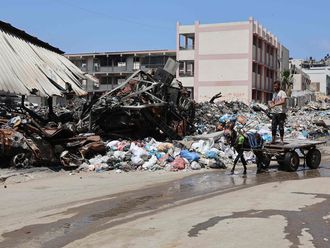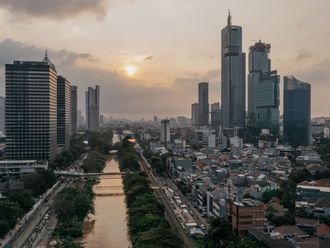Dubai: US Secretary of State John Kerry’s efforts to revive negotiations between the Palestinians and the Israelis after years of stalemate serve American interests in the region first, analysts said.
Political analysts however differ in correlating the American efforts with the “big explosion” in the region, in reference to the Arab Spring-related instability and anti-regime movements that are sweeping Arab countries including Egypt, one of the main US allies in the region, and Syria.
“There is going to be no solving of the Palestinian question amid this big explosion in the region and the existing uncertainty could carry unpredictable consequences to the Americans,” said Hunaida Ganem, the head of the Madar centre for research in the West Bank city of Ramallah.
“Solving the Palestinian situation could give the Americans some sort of a feeling they are still in control of the region,” she added when asked of the timing of the American efforts.
However, other analysts say Kerry’s shuttling and frequent talks in the past few months to bring back the Palestinian and Israelis to the negotiation table are not related to the Arab Spring.
“They are related to internal American considerations more than anything else,” said Gassan Al Khatib, former member of the Palestinian negotiation team and former spokesperson of the Palestinian Authority.
“In my opinion, going back to negotiations is part of conflict management,” said Hunaida.
“Israel never has a problem in resuming the talks. It was the Palestinian side that felt after the passing of many years it achieved nothing,” she said.
After Israel’s decision to release prisoners and Palestinian concern not to be seen as missing an opportunity, Palestinian negotiators are going to go ahead with the talks, she added.
The Palestinians are demanding establishing a state in the West Bank, occupied east Jerusalem and Gaza strip – all are lands occupied by Israel in the 1967-Arab-Israeli war.
Palestinian officials were quoted as reiterating on Monday that they received US assurances that Washington considers the 1967 lines the basis for border talks.
But analysts noted that the accelerated pace of building Jews-only colonies in the West Bank and Gaza Strip constitute the biggest obstacle in making any progress.
“Both colonies and borders are one topic,” said Khatib. Colonies comprise all other topics that were left to the final stage of peace talks in the 65-year-old-conflict, he noted. They include borders, water, refugees, security and occupied East Jerusalem.
“Reality on the ground constitutes the biggest obstacle in achieving a breakthrough,” said Hunaida. “What we see on the ground today, in terms of colonisation activities, seemed to be impossible many years back,” she added in reference to the big differences between the start of the peace talks and present.










_resources1_16a3106a819_small.jpg)

